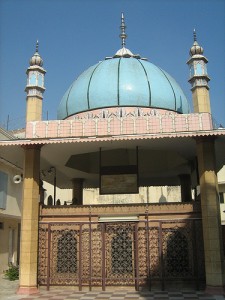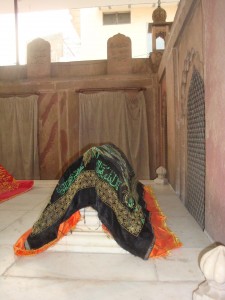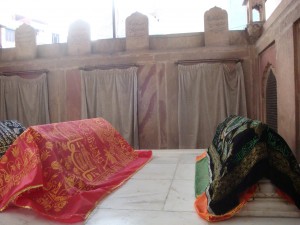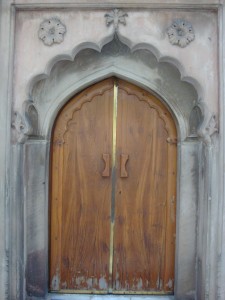Hadhrat Mirzā Mazhar Jān-e-Jānān Shahīd, may Allah sanctify his secret, was born on Friday 11th Ramadān 1111 AH. He was an Alawi by descent, from the descendants of Sayyidina Imam Ali, may Allah be pleased with him.
The great Mughal emperor Aurangzeb, who was also a follower of the Naqshbandi tariqah, suggested Jān-e-Jān as his name which later turned into Jān-e-Jānān.

The shrine of Mirza Mazhar Jān-e-Jānān in Khanqah Mazhariyah, Delhi, India
At the age of 18, he entered the servitude and spiritual studentship of Hadhrat Sayyid Nūr Muhammad Badāyūnī (1135 AH), a great Naqshbandi shaykh and a khalifah of Khwaja Saifuddīn Fārūqī Sirhindī (1096 AH). After four years, he received khilafah from his shaykh in the Naqshbandi Mujaddidi tariqah. When his shaykh passed away, he used to receive Fayd and spiritual training from the grave of his shaykh for about six years.
At last, his shaykh commanded him to seek a living Sufi master to strengthen the Nisbah and seek further spiritual stages in this path. Thus he went to different masters of the Naqshbandi tariqah, and spent most of his years with three Sufi masters:
- Hājī Muhammad Afzal Siyālkotī (d. 1146 AH) who received Nisbah from Khwājā Muhammad Naqshband Sirhindī and Shaykh Abdul Ahad Wahdat Sirhindī. Mirzā Mazhar received the Ijāzā of Hadith from him.
- Hāfiz Sa’adullāh (d. 11 Shawwāl 1152 AH), khalifah of Shaykh Muhammad Siddīq Sirhindī who was a son and khalifah of Khwājā Muhammad Masūm Sirhindī
- Shaykh Muhammad Ābid Sunnāmī (d. 18 Ramadān 1160 AH), khalifah of Shaykh Abdul Ahad Wahdat Sirhindī
Among his famous pupils is the great Mufassir of the Holy Quran Allamah Qādī Thanāullāh Pānīpatī (1225 AH) who wrote many books in the sciences of Fiqh, Tafsīr, Tasawwuf, among them the Tafsir al-Mazhari.
A list of his khulafa is available here.
He was martyred by a Rafidhī who shot him with a gun on 7th Muharram 1195 AH, and he passed away to the eternal world in the night of Saturday 10th Muharram 1195 AH. He was buried in his khānqāh in Delhi, India.
The next in the Naqshbandī Mujaddidī Tāhirī spiritual golden chain is Shāh Abd-Allāh Ghulām-Alī Dihlawī.
Photo Gallery

The noble grave of Mirza Mazhar Jan-e-Janan, in Khanqah Mazhariyah, Delhi

The noble grave of Mirza Mazhar (right) and his chief successor Shah Ghulam Ali Dehlavi (left)

Entrance to the Khanqah Mazhariya complex

Mosque in Khanqah Mazhariya, Delhi

Door to a room which is purported to be the room where a fanatic Shia shot Hazrat Mirza Mazhar with a handgun, which led to his martyrdom.
Deputies of Mirza Mazhar Jan-e-Janaan Shaheed
Khulafa of Hadhrat Mirzā Mazhar Jān-e-Jānān (1111-1195 AH)
- Hadhrat Shah Abdullah alias Ghulam Ali Dehlavi Mujaddidi, the chief deputy and successor, Mujaddid of the 13th Islamic century
- Hadhrat Sayyid Mir Musalman, died during his Shaykh’s life
- Hadhrat Qādī Thanāullāh Pānīpatī, the great scholar who wrote Tafsir al-Mazhari and many well known Islamic books
- Hadhrat Maulana Fadhl-Allah Pani-pati, elder brother of Qadi Thana-Allah
- Maulana Ahmad-Allah, elder son of Qadi Thana-Allah, died at young age of 30 years
- Shaykh Muhammad Murad
- Shaykh Abdul-Rahman
- Mir Aleem-Allah Gangohi
- Shaykh Murad-Allah, alias Ghulam Kaki, died in his Shaykh’s lifetime
- Hadhrat Shaykh Muhammad Ehsan, a descendant of Shaykh Abdul-Haqq Muhaddith Dehlavi
- Shaykh Ghulam Hasan
- Shaykh Muhammad Munir, a descendant of Shaykh Farid Ganjshakar. He died during his Shaykh’s lifetime
- Khwaja Ibad-Allah, a descendant of Khwaja Baha’uddin Naqshband
- Maulana Qalandar Bakhsh
- Mir Sayyid Naeem-Allah, died during his Shaykh’s lifetime
- Hadhrat Maulana Thana’-Allah Sanbhali, a student of Shah Wali-Allah
- Hadhrat Mir Abdul-Baqi
- Khalifa Muhammad Jameel, died during his Shaykh’s lifetime
- Hadhrat Shah Bheek, descendant of Imam Rabbani Shaykh Ahmed Sirhindi
- Maulana Abdul-Haqq, died in young age
- Shah Muhammad Saalim
- Shah Rahmat-Allah, from Sindh
- Hadhrat Muhammad Shah
- Mir Sayyid Mubeen Khan
- Mir Muhammad Mu’een Khan
- Mir Ali Asghar, alias Mir Makhu
- Muhammad Hasan Arab
- Hadhrat Muhammad Qa’im Kashmiri
- Hadhrat Hafiz Muhammad
- Maulana Qutb’uddin
- Maulana Ghulam Yahya, died during his Shaykh’s lifetime
- Maulana Sayyid Ghulam Mohiuddin
- Maulana Naeem-Allah Behra’ichi (b. 1153), author of many books including biography of Hadhrat Mirza Mazhar
- Maulana Muhammad Kaleem Bangali
- Mir Ruh al-Ameen
- Shah Muhammad Shafi’
- Hadhrat Muhammad Hussain
- Shaykh Ghulam Hussain Thanisari
- Maulana Abdul Kareem (Burdwan, West Bengal, India)
- Maulana Abdul Hakeem (Burdwan, West Bengal, India)
- Nawab Irshad Khan (d. 1176 AH)
- Ghulam Mustafa Khan
- Akhun Noor Muhammad Qandahari
- Hadhrat Akhund Mulla Naseem (Uch Sharif, Pakistan, d. 1231 AH)
- Hadhrat Mulla Abdul-Razzaq
- Hadhrat Mulla Jaleel
- Hadhrat Mulla Abd-Allah
- Hadhrat Mulla Taimoor
Sources
- Maqamat Mazhari by Shah Ghulam Ali Dehlavi, Urdu Translation by Muhammad Iqbal Mujaddidi, Urdu Science Board Lahore, 2001